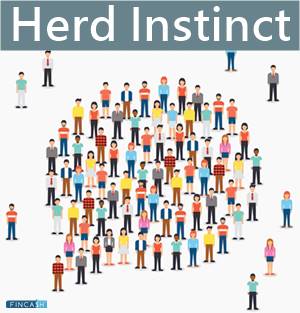
Table of Contents
What is Herd Instinct?
The term "herd instinct" refers to when a big group of individuals behaves in the same way at the same time. Rather than their own independent thinking, they are heavily affected by emotion and instinct.

Herd behaviour is caused by a variety of factors. The most evident is a lack of knowledge. Herd instinct manifests itself in the stock markets as Volatility. As a large number of people try to enter or quit the Market at the same time, prices rise or fall unexpectedly.
In other words, an investor with a herd mentality tends to gravitate toward assets that are similar to those of others. Panic buying and selling may result in asset bubbles or market collapses when the herd instinct is used at scale.
Herd Instinct Examples
Friends get together on a regular Basis to talk about investment alternatives and their favourite stocks of the week. A acquires XYZ shares for her fund during one of their meetings. She did some research on the firm and found its basics to be appealing.
A's excitement spreads quickly, and soon everyone is interested in XYZ stock. However, XYZ revealed severe cash issues and declining sales a month later. As a result, the company's stock price drops. The herd instinct has harmed the other people. Instead of thoroughly checking out, they relied on each other's excitement. In other words, their herd instinct distorted their judgement and stopped them from doing an independent analysis.
Herd Behaviour in Humans
Human herd behaviour is a type of social behaviour in which people surrender their particular wills, beliefs, and acts to the majority. Herding does not necessitate the presence of a leader; rather, it necessitates individuals working in conjunction at the same moment. Social and economic issues might have an impact on it.
Reasons Behind Herd Instinct
There could be a variety of reasons why people are drawn toward certain instincts. Some of them are as follows:
- Due to a lack of individuality, people rely on others' decisions. In such circumstances, there is no good or wrong for an individual; whatever is done is done for the entire group
- One of the most prevalent explanations is psychological behaviour. Since humans are all social animals, they prefer to stay and travel in groups. As a result, it's part of the natural inclinations
- People who invest with a certain group believe that the group has all of the necessary and reliable information
Impact of Herd Instinct on Investments
Herd instinct has caused more losses to investors throughout the world than any other behavioural bias. It has the following consequences:
The creation of volatility in financial markets is due to this herd instinct. Surprisingly, herd behaviour is reinforced by this unpredictability. A self-fulfilling prophecy emerges from the herd's behaviour
Herd instinct produces asset bubbles as a result of its action. The propagation of a misleading trend throughout the whole market is the definition of an asset bubble. The issue with herd instinct is that no one double-checks the facts. Rather, everyone assumes that everyone in the group is up to date. As long as the crowd does not act irrationally due to herd instinct, a stratospheric spike in prices and a catastrophic crash are impossible
How to Avoid Herd Instinct?
It's critical to be conscious of herding's natural propensity. Your choice should be based on your requirements rather than what everyone else is buying. So, what's the best way to keep yourself from herding?
Some of the tactics you can employ are listed below:
- Do not make any hasty judgments. Take additional time to consider your options before making a choice
- The best way to make a decision is first to understand one's own heart, strengths, and limitations
- Be aware of the consequences of making judgments in a stressed environment
- Before you follow, take a moment to consider your options. Make a well-informed judgement by gathering information and establishing your own view
The Bottom Line
The herd is not synonymous with bad; nonetheless, relying too much on it leads to ignorance and distorts the knowledge used to make choices. Generally, in times of uncertainty, individuals become fearful and rely on the herd for guidance. People's choices are strongly influenced by their reliance on the herd, whether they are conscious of it or not. As a result, it is critical for people to be more aware of the information they use to make decisions.
All efforts have been made to ensure the information provided here is accurate. However, no guarantees are made regarding correctness of data. Please verify with scheme information document before making any investment.





